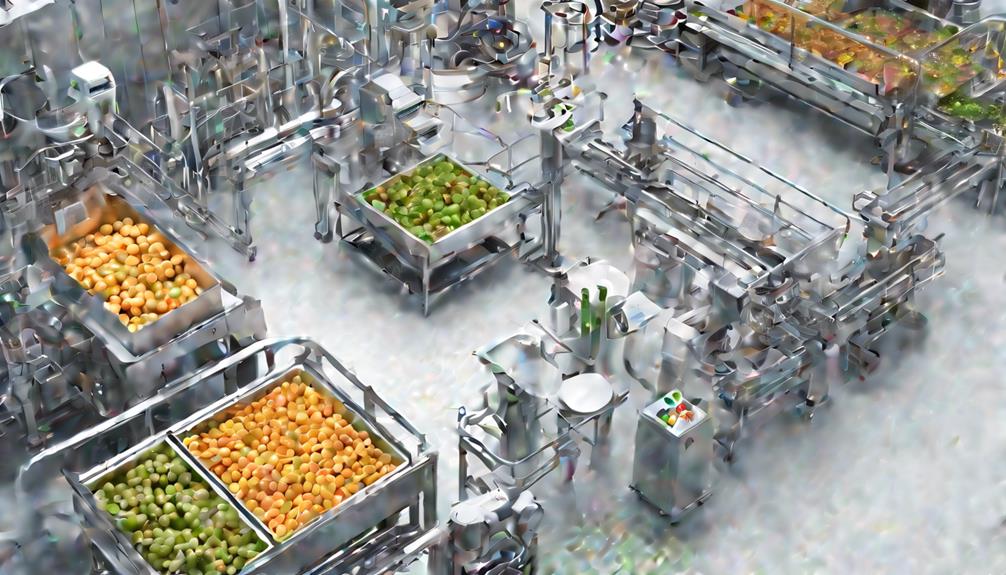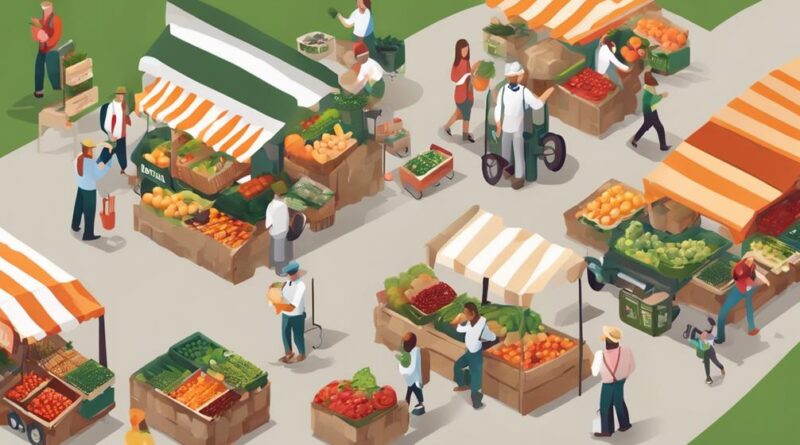What Role Does Technology Play in Organic Food Globalization?
Technology significantly impacts organic food globalization by optimizing supply chains, improving consumer engagement, and ensuring transparency. Inventory software and GPS tracking enhance efficiency. Digital marketing utilizes social media and data targeting. Blockchain enhances traceability and safety. E-commerce connects consumers with producers directly. Precision agriculture tools promote sustainable practices. Quality control benefits from real-time monitoring and automation. Consumer education campaigns inform about organic benefits and labeling regulations. Embracing technology is key to driving the organic food market globally.
Enhancing Supply Chain Efficiency
To improve the global distribution of organic food products, enhancing supply chain efficiency is paramount. An essential aspect of this enhancement is inventory optimization. By utilizing advanced technology such as inventory management software and data analytics, organic food suppliers can ensure that they maintain optimal inventory levels. This not only prevents stockouts but also minimizes excess inventory, reducing waste and carrying costs.
Transportation logistics also play a significant role in improving supply chain efficiency for organic food globalization. Leveraging technologies like GPS tracking and route optimization software can streamline the transportation process, leading to faster delivery times and reduced transportation costs. By optimizing delivery routes based on real-time data and traffic conditions, organic food suppliers can ensure that their products reach consumers promptly and in optimal condition.
Furthermore, implementing warehouse management systems can enhance efficiency in storage and order fulfillment processes. These systems help in organizing inventory, increasing picking accuracy, and reducing order processing times. By automating repetitive tasks and providing real-time visibility into warehouse operations, organic food suppliers can significantly improve their supply chain efficiency.
Digital Marketing Strategies
Enhancing supply chain efficiency through inventory optimization and transportation logistics lays a strong foundation for implementing effective digital marketing strategies in the organic food industry. Digital marketing has become a crucial tool for organic food producers to reach a wider audience and communicate their brand values. Leveraging social media platforms is essential in today's marketing landscape. By utilizing platforms such as Instagram, Facebook, and Twitter, organic food companies can engage with consumers, showcase their products, and educate followers about the benefits of organic food consumption.
In addition to social media, influencer partnerships have proven to be highly effective in promoting organic food products. Collaborating with influencers who align with the brand's values and have a significant following can amplify the reach of marketing campaigns. Influencers can create authentic content that resonates with their audience, leading to increased brand awareness and trust among consumers.
Data-driven digital marketing strategies allow organic food companies to target specific consumer segments, track performance metrics, and adjust campaigns in real-time for optimal results. By analyzing consumer behavior and engagement metrics, companies can refine their marketing efforts to maximize return on investment. Overall, integrating social media engagement and influencer partnerships into digital marketing strategies can significantly enhance the visibility and reputation of organic food brands in the global market.
Traceability and Transparency Solutions
Implementing traceability and transparency solutions in the organic food industry enhances accountability and trust throughout the supply chain. Utilizing blockchain technology can revolutionize the way organic food products are tracked and verified, ensuring authenticity and quality. Here are some key points to consider:
- Enhanced Food Safety: Blockchain technology allows for real-time monitoring of organic products from farm to table, reducing the risk of contamination and enhancing overall food safety measures.
- Improved Supply Chain Visibility: By implementing traceability solutions, consumers can track the journey of their organic food products, promoting transparency and trust in the supply chain.
- Certification Verification: Blockchain technology enables instant verification of organic certifications, ensuring that products meet the required standards for organic labeling.
- Combatting Fraud: Traceability solutions powered by blockchain can help in detecting and preventing fraud in the organic food industry, safeguarding the integrity of organic products.
- Consumer Empowerment: Through increased transparency, consumers are empowered to make informed decisions about the organic products they purchase, fostering a sense of confidence and loyalty in the brand.
E-commerce Platforms Boost
With the surge in online consumer behavior, e-commerce platforms are catalyzing the global reach and accessibility of organic food products. Online farmers' markets have become a prominent feature in the digital landscape, connecting consumers directly with local and international organic producers. This direct-to-consumer model eliminates the need for intermediaries, ensuring fresher produce and fairer prices for both farmers and buyers.
Virtual grocery shopping is reshaping the way people access organic foods. Through e-commerce platforms, individuals can browse a vast array of organic products, compare prices, read reviews, and make purchases from the comfort of their homes. This convenience has significantly contributed to the growth of the organic food market globally, making it easier for consumers to adopt healthier and more sustainable eating habits.
The data reflects this trend, with a notable increase in online sales of organic food products over the past few years. According to industry reports, the e-commerce organic food market is projected to continue its upward trajectory, driven by the convenience and accessibility offered by online platforms. Furthermore, the rise of e-commerce has enabled small organic producers to reach a wider audience beyond their local markets, fostering a more inclusive and diverse organic food industry on a global scale.
Precision Agriculture Advancements
Precision agriculture techniques have revolutionized organic food production by leveraging cutting-edge technology to optimize crop yields and resource management. These advancements have significantly impacted the way organic farmers operate, leading to more sustainable practices and increased productivity.
Here are some key aspects highlighting the importance of precision agriculture in organic food production:
- Data analytics: Utilizing advanced data analytics tools allows farmers to make informed decisions based on real-time information, leading to better crop management strategies and resource allocation.
- Crop monitoring: Through the use of drones, satellites, and sensors, organic farmers can closely monitor their crops' health, growth patterns, and environmental conditions, enabling them to intervene promptly when issues arise.
- Precision irrigation: Smart irrigation systems help organic farmers deliver the right amount of water to their crops, reducing water waste and ensuring optimal growth conditions.
- Soil health management: Precision agriculture techniques enable farmers to assess soil health accurately, leading to targeted soil treatments and improved overall soil quality.
- Yield mapping: By generating yield maps using GPS and sensor technologies, organic farmers can identify areas of their fields with varying productivity levels, allowing for targeted interventions to maximize overall yields.
These advancements in precision agriculture are crucial for the continued growth and sustainability of organic food production on a global scale.
Global Market Accessibility
How does technology influence the accessibility of the global organic food market?
Technology plays a crucial role in enhancing global market accessibility for organic food products through the optimization of distribution networks and the facilitation of targeted market research. By leveraging technology, organic food producers can streamline their distribution networks, ensuring that products reach consumers in various regions efficiently. Advanced tracking systems, automated inventory management, and real-time data analytics enable companies to coordinate with suppliers, distributors, and retailers seamlessly, reducing delays and optimizing the supply chain.
Moreover, technology empowers organic food businesses to conduct in-depth market research, gaining valuable insights into consumer preferences, trends, and demands worldwide. Through data analytics, companies can identify emerging markets, customize their offerings to suit local tastes, and develop targeted marketing strategies. This data-driven approach not only expands market reach but also enhances customer engagement and brand loyalty.
Additionally, e-commerce platforms and online marketplaces supported by technology provide organic food producers with direct access to a global customer base. By establishing online storefronts and utilizing digital marketing tools, companies can overcome geographical barriers, reach a broader audience, and promote their products effectively. The ease of online transactions and the convenience of doorstep delivery further contribute to making organic food more accessible to consumers worldwide.
Quality Control Innovations

Technology advancements have revolutionized quality control processes in the organic food industry, ensuring higher standards and safety measures are met consistently. These innovations have significantly enhanced the way organic food is monitored and regulated, providing consumers with greater transparency and trust in the products they purchase. Here are some key innovations that have reshaped quality control in the organic food sector:
- Smart Packaging: The integration of smart packaging technologies allows for real-time monitoring of various factors such as temperature, humidity, and freshness. This ensures that organic products remain in optimal conditions throughout the supply chain, reducing the risk of spoilage or contamination.
- Sensor Integration: Sensors embedded in production equipment and storage facilities can detect any deviations from the desired standards. By continuously collecting data on parameters like moisture levels and microbial activity, these sensors enable early identification of potential issues, leading to more proactive quality control measures.
- Blockchain Traceability: Utilizing blockchain technology enables complete traceability of organic products from farm to fork. This not only helps in detecting any anomalies in the supply chain but also enhances accountability and authenticity, assuring consumers of the organic integrity of the food they consume.
- Data Analytics: Advanced data analytics tools process vast amounts of information to identify patterns and trends that could indicate quality control issues. By leveraging predictive analytics, organic food producers can preemptively address potential risks and maintain the highest standards of quality.
- Automated Inspection Systems: Automated inspection systems equipped with machine learning algorithms can quickly scan organic products for any defects or contaminants, streamlining the quality control process and minimizing human error. These systems ensure consistent quality standards are met across all organic food products.
Consumer Education and Awareness
Consumer awareness plays a pivotal role in shaping the organic food market and influencing purchasing decisions. Education campaigns are fundamental in increasing consumer knowledge about organic products. These campaigns aim to inform consumers about the benefits of organic food, such as being free from synthetic pesticides and GMOs, promoting environmental sustainability, and potentially offering better nutritional value. Studies have shown that consumers who are more educated about organic farming practices and the benefits of organic products are more likely to choose organic options.
Labeling regulations also play a crucial role in consumer education and awareness. Clear and standardized labeling helps consumers easily identify organic products and understand what the organic certification entails. Regulations ensure that products labeled as organic meet specific criteria set by certifying bodies, providing consumers with confidence in the products they purchase. Moreover, labeling regulations help prevent misleading claims and greenwashing, where products are marketed as organic without meeting the necessary standards.
Conclusion
In conclusion, technology plays a crucial role in the globalization of organic food. It enhances supply chain efficiency, enabling digital marketing strategies and providing traceability solutions. Technology also boosts e-commerce platforms, advances precision agriculture, and improves global market accessibility. Moreover, it innovates quality control measures and educates consumers.
With the integration of technology in the organic food industry, we can expect to see continued growth and expansion of organic products on a global scale.
